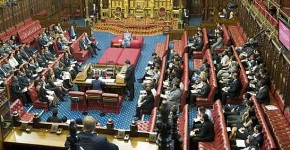reforming the house of lords
‘A CENTURY OF NON-REFORM’
The Parliament Act of 1911 affirmed the House of Commons as the primary chamber of government and introduced some limits to the powers of the Lords. These were intended as an interim measure until the Lords could be “constituted on a popular instead of hereditary basis”. A century of non-reform later, we're still waiting for a democratically constituted second chamber.
Over that century there has been no shortage of proposals on further reform of the Lords - the shelves of constitutional libraries are fairly groaning under the weight of commissions, reports and recommendations. Virtually all agree with the British public that the second chamber should be democratically elected. But recommendations have not been matched by action. True, the nature of the Lords changed with the introduction of life peers in 1958, but nothing was done to remove hereditary peers until Labour came to power in 1997.
The House of Lords Act 1999 reduced the number of hereditary peers to a rump of 92 as a prelude to genuine reform. The Labour government then made several attempts during its 13 years in office to reach a cross-party consensus on a way forward, but all failed.
Although the pruning deprived the Conservatives of an absolute majority, they remain by far the largest group within the Lords, and their numbers keep growing. ‘Cash-for-honours’ scandals are not an exclusive preserve of the Conservatives, but they are by far the worst offenders - it has been reported that one in 10 Tory peers have given more than £100,000 to the Conservative Party.
Reform or abolition?
In its early years, Labour wanted the Lords abolished rather than reformed, and that was also the position taken by Labour’s NEC at the end of the 1970s.
It is not obligatory for Britain to have a bicameral system - many countries operate with just a single chamber. Scrutinizing and revising draft legislation could be done by committees of MPs, although the partisan nature of most House of Commons Bill Committees suggests that such scrutiny would simply replicate the debates in the House of Commons Chamber. And some argue that giving extra work to MPs could choke the passage of legislation and detract from its quality.
While FPTP gives governments parliamentary majorities that enable them to push what they want through the Commons, there is value in having another forum which can at least question and delay government proposals.
AN ASSEMBLY OF THE NATIONS AND REGIONS
The Brown Commission has proposed replacing the Lords with an Assembly of the Nations and the Regions, and Keir Starmer has given the idea his backing. The new body would have electoral legitimacy (although the Commission left the meaning of this as a matter for consultation) and a revised remit as part of a package of constitutional changes to ensure a greater devolution of power away from Westminster.
Like most good ideas, it’s not fully original – Robin Cook, along with Lib Dem Paul Tyler and the Conservatives’ Ken Clark, worked on a very similar proposal in the 2000s, but they went much further in recommending the use of open lists or STV with the existing nations and regions as multi-member constituencies.

let's get the job done
The ‘second chamber’ has an important role in formulating our laws and the policies of our government. LCER finds it unacceptable that many of the members of this body are landed aristocrats and/or big political donors (mainly ones who fund the Conservative Party).
We should be able to choose the people who make our laws. That means elections.
The culture of the second chamber is different from the Commons – no party has a majority, its debates are less whipped, and governments don’t depend on its votes for their survival – and the quality of its work rests as much on the quality of its members as its political composition. Elections for the second chamber should therefore be about choosing people and not just voting for parties.
Parties are nevertheless important. We need a second chamber which broadly reflects the views of the electorate, which necessitates a voting system that ensures party proportionality. The best way to achieve all those requirements is an open list system or STV.
A proportional second chamber must not, however, be seen as an alternative to a proportional Commons – we need both. Arguments that a proportionally-elected second chamber would undermine the primacy of the Commons have no substance: the second chamber, particularly if the Brown Commission’s proposals were adopted, would have a quite separate mandate. Moreover, even if both used proportional systems, it would make sense for a ‘Committee of the Nations and Regions’ to use much larger electoral areas than the Commons where preserving local representation and accountability is more important.
Should the second chamber be fully elected, or part elected and part appointed? Some have argued that a minority of appointed members would make it easier for people of distinction who would be unlikely to win in a party-based campaign to get elected. Reserved places for candidates with no party affiliation might be a more democratic way of achieving the same thing.
Some have argued that members of the second chamber should have long, and non-renewable, terms of office to make them more independent of party whips. However, while we need independent thinkers, accountability to the electorate is important and that’s why periodic elections are needed.
The UK has dithered on ‘Lords’ reform for too long. We have not stood strongly enough against opposition from within the Lords. We have allowed debates on composition to get derailed by debates on purpose, important though those debates may be. Gordon Brown’s Commission has given us a chance to complete a job that started more than a century ago and we must not waste the opportunity.
